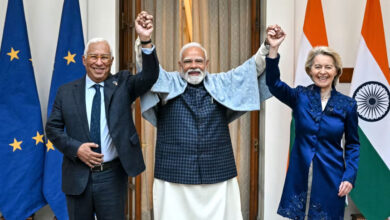
EU Ambassador to Cairo James Moran has described as "normal" the European Parliament's recent discussions on the mysterious death of Italian student Giulio Regeni and the human rights situation in Egypt in general.
Speaking to Al-Masry Al-Youm, Moran said that it was normal for the parliament to discuss such matters, because the issue was disturbing, confusing, and subject to debate in many European countries.
However, Moran didn't comment in detail on the resolution passed as a result of the discussion, which was harshly critical of Egypt.
On Thursday, the European Parliament passed a resolution calling on Egypt to provide Italy with all the information necessary to properly investigate the death of Regeni, an Italian PhD candidate whose body was found on the outskirts of Cairo in early February. The resolution also recommended suspension of military aid to Egypt in light of recent events.
The European Parliament strongly condemned alleged human rights abuses in Egypt, as well as the disappearance, torture and murder of Regeni under suspicious circumstances. The resolution framed the death of the student in the context of continuing allegations over human rights abuses in Egypt, insinuating the likely involvement of Egyptian security services in Regeni's death.
Moran said that parliaments around the world have the right to discuss any issue they wish, and the topic of Regeni's death was an obvious topic for debate, as was the human rights situation in Egypt.
While he didn't provide any detailed comments on either human rights issues or Regeni's death, he did say that the controversial episode would be "beneficial for the Egypt" in the long-run, and the country would "return to normal".
During the interview, Moran sought to emphasise the positive side of Egypt-EU relations, pointing to cooperation on economic and security matters in particular, and saying that the stability of Egypt was a priority for the EU.
With much of the Middle East and North Africa affected by war and terrorism, joint security efforts have been a key part of Egypt-EU relations in recent years, while the recent surge in refugees entering Europe has been the subject of heated debate.
Moran said the EU and Cairo cooperate to provide support for refugees living in Egypt, and Europe appreciates joint efforts with Egypt to combat illegal immigration. He added that stronger cooperation is needed to eliminate brokers who make money from the illegal transfer of migrants and refugees to Europe.
"Egypt has passed through difficult circumstances since 2011, from which it learned and taught the whole region many lessons," said Moran.
He said that Egypt had conducted three successful elections, and has taken important steps in economic reform, such as cutting subsidies, but the economic challenge remains due to the huge population growth.
Egypt's high population growth rate has been cause for concern among economists and development experts, who predict increasing environmental socio-economic problems due to the strain on resources. Some figures predict Egypt overtaking Russia and Japan in population size, with an estimated population of 137.7 million people by 2050.
According to the ambassador, Egypt has to deal with two big challenges in future: the large and growing population, which occupies only 6 percent of Egypt's land area; and the need for economic reform.
He added Egypt has already taken steps toward reform, the most important of which was the decision to cut subsidies, but Egypt still needs more decisive steps in this regard.
The trade sector faces many difficulties in Egypt due to restrictions, he said, but trade between the EU and Egypt could improve if new trade policies are developed.
Edited translation from Al-Masry Al-Youm




